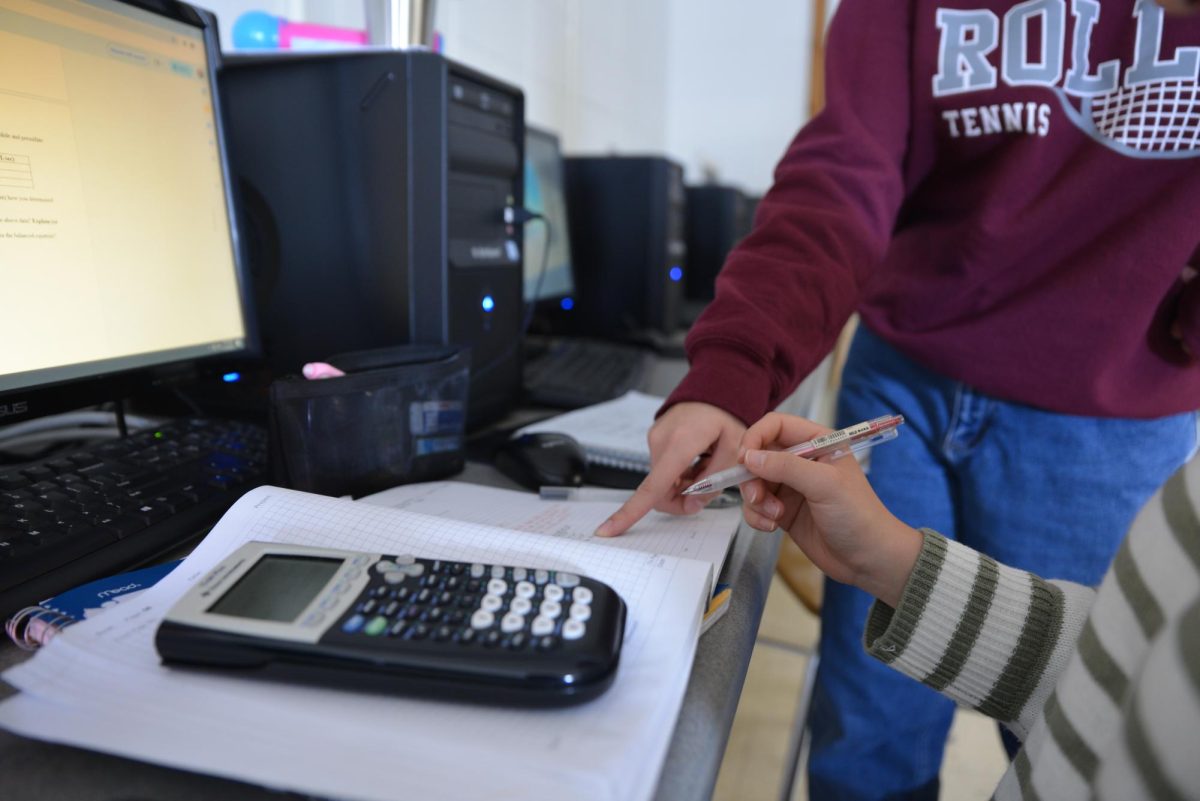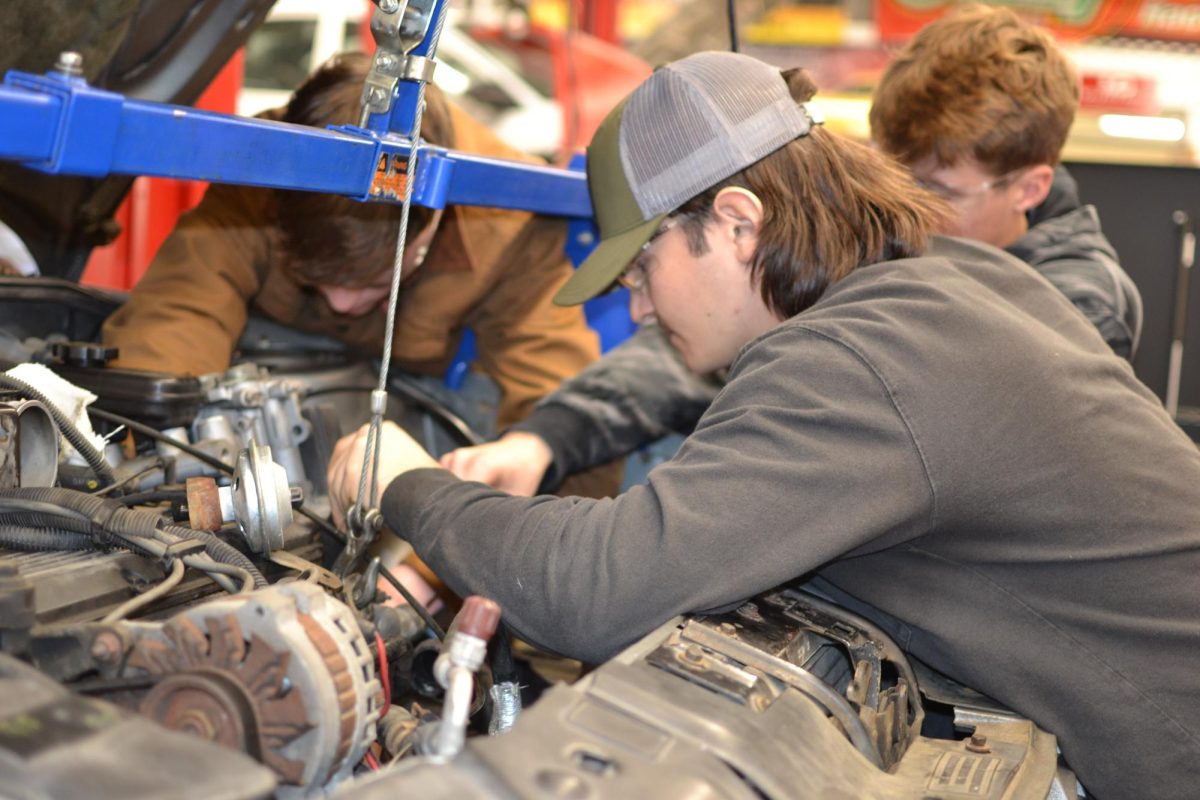This year, instead of the traditional Thanksgiving of stuffing myself to the point of a food baby in my stomach, my dad suggested that he and I would go on a mission trip to Belize, a small tropical country in Central America. I jumped at the chance of a hot, sunny vacation; the “mission” part sailing over my naïve head. As the trip approached my anticipation quickly grew. I was traveling out of the country! To Central America! With the Caribbean Sea and sandy beaches! I expected paradise. I received that and so much more that I could have imagined.
At 6:45 I was awakened by my dad. We stayed the night in St. Louis at my grandparents’ house because the plane left early on Sunday morning. The flight wasn’t until 10, but my dad insisted on arriving to the airport 2 hours before boarding. I groggily showered and dressed and we drove to the airport. Thirty minutes later, after bags were checked and security taken care of, we sat in the terminal and waited. And waited. I impatiently glanced over with dirty looks toward my father, grudging the fact that he woke me up at 6 in the morning to sit in a terminal for an hour and a half. Finally we boarded and up in the air to Houston Texas, our first stop before paradise.
The plane landed in Houston and we hungrily power walked to the nearest food court. Panda Express called my name like a chorus of little Asian angels. We were to meet up with our group in Houston before the connecting flight to Belize boarded. There were eight of us expected. The leader, a woman by the name of Marla, her daughter and son, Allie and Petey, Chelsea, a college student, Linda, a middle aged woman who was there for business, my 24 year old cousin Amy, and my dad and I. We came from all over the Midwest, from Louisville Kentucky, to Indianapolis, to my humble abode of Rolla Missouri.
We met up with the six from Louisville and exchanged awkward and shy greetings. Gathering our luggage, we made our way to the gate searching for Amy along the way, who was nowhere to be found. The woman at the front desk announced for passengers to board. My dad frantically called his sister—Amy’s mom—and found out that due to mechanical problems with the plane, Amy was almost an hour behind schedule. She would end up missing the flight to Belize and be stuck in Houston for the night until the next flight left the following afternoon.
After another two hour flight across the Gulf of Mexico and Central America we landed in Belize. Stepping off the plane, heat hit me like a wall. The humidity lingered in the air, even when the occasional hot breeze wafted by. We waited in line at customs for over thirty minutes, surrounded by tourists coming to visit the scenic country with its white sandy beaches and turquoise sea. It felt strange knowing that I wasn’t coming for a vacation, but a mission to help others. I wasn’t going to be staying at a resort, lying out in the sand under the bright sun. I was to be staying with the poorest of the poor, living among those who had literally nothing but shacks to live in.
We were picked up at the airport by a black woman named Roxanne (the trip coordinator) and shuttled in a 15 passenger van through Belize City. Potholes covered the narrow dirt streets, due to the recent hurricane that blew through the country. Roxanne weaved around them like an expert, swerving to miss hitting bicyclists and pedestrians. The traffic was like Kingshighway on steroids. Every driver it seemed was mad with road rage, speedily veering from one side of the road to the other, passing vehicles. I was amazed I didn’t see one car accident.
We arrived at the Starfish House, a bright blue two-story residence with an old iron gate. Immediately we went inside to explore and claim rooms.
Roxanne introduced us to the staff of the house, a dark woman by the name of Caroline. She was beautiful and the most incredible cook. After a quick orientation, we piled into the van and attended mass at the local Catholic Church, St. Martin De Porres. It was the most exciting church service I have ever been to. The entire congregation sang to the tinny circus-like keyboard and bongos, clapping and praising God.
Dinner consisted of the most delicious chicken and rice made by Caroline. We dubbed her “Sweet Caroline” and sang the Neil Diamond song to her every chance that we got. Caroline left when her shift was over, and was replaced by a night guard named Mista T, a tiny Mexican man no more than 5 foot 2 inches tall. Once I asked him if he had a gun to use for protection against any intruders and he replied, “No I use machete. Anyone who comes I cut them up”. I left it at that.
6:45 again I was awakened. We shuffled sleepily downstairs to the kitchen, where Sweet Caroline was making our breakfast: scrambled eggs and Johnny cakes. After changing into work clothes we were picked up in the big van by Roxanne. We sped through the city, turn sharply left and right to avoid potholes and cars. It didn’t take long to reach the ghetto. Shacks stood shakily on stilts, heaps of trash laying on the side of the road and in peoples’ yards. Roxanne drove around the slums, explaining the sordid situations that the locals lived in.
We reached our destination, a house no bigger than a shed, falling apart. An area of mud set next to it. We got out of the van, instantly sinking into sludge, covering our shoes. A black woman named Lisa greeted us with enthusiasm. She was the client for whom we were building the house. Following a prayer, we were introduced to the two “engineers” of the project, Beto and Alphonso. Immediately we were put to work. The hot sun beat down on our backs, even though it was only 9 in the morning. Beto asked for helpers to go with him to get supplies at the lumber yard and I jumped at the chance to ride in the big truck through the narrow streets of the city. Petey, Marla’s son, joined Beto and me on the adventure. On the ride, Beto, after finding out we took Spanish in school, excitedly spoke the language to us. For the rest of the drive we pathetically tried to comprehend and translate his sentences.
Once we piled the lumber in the back of the truck and returned to the work site, we started building the walls and the base of the house. Friendly neighbors stopped by to help out. At one point, Petey and I were asked to mix cement. Having no idea how to do it, we helplessly looked around for some help. A man named Abel dived in and assisted us, helping mix the cement until it was finished. He worked all day with us, and then at six in the evening left to go to his 12 hour night job as a security guard. I was amazed at his hard work and perseverance to help us out. At the end of the day, exhausted after eight hours of hard labor, we piled into the van and headed back to the Starfish House. Beto and Alphonso complimented us on how far we had come. We were a day and a half ahead of schedule, finishing the base of the house and all four walls.
Back at the Starfish house, we decided to go exploring down the dirt streets. We walked to the ocean, and I was surprised to see how dirty and brown it was. I expected bright blue sea that one could see straight to the bottom. But this ocean was murky and filled with trash and sewage; definitely not swimming material. We walked to the local grocery stores, buying everything at “half price” because the American dollar was worth twice as much as the Belize dollar.
We ate a dinner of chicken and rice, and afterwards looked at the clock and I was shocked that it was only 6 o’clock! The moon had already risen and night enveloped the city. Worn out from the long day, I went up to my room to shower and got ready for bed. I passed out into a deep slumber by 7:30.
We were picked up in the truck instead of the van the following morning. Not all of us could fit in the front cab so we piled into the back. This is one of my most vivid memories of the trip; the hot breeze blowing on us as we bustled through the city, waving at all the people and them heartily waving back and yelling salutations. We loaded MORE lumber into the back of the truck and rode the rest of the way to the worksite.
After unloading all the wood, Beto asked if anyone would like to run some errands with him to pick up sheet metal for the roof. I jumped at the opportunity, and Amy also volunteered. We journeyed through the winding busy streets. Our first destination was a hardware store that reminded me of a mini Lowes. Beto quickly listed off a string of words in Creole, the native language. He added a sentence at the end, and the big man behind the counter laughed and looked over at us. I felt stupid because I couldn’t speak or understand the language. When I was with the natives and they spoke Creole to each other I couldn’t help but wonder if I was the topic of their conversation or the butt of their joke.
Our job at the hardware store took forever it seemed like, because instead of using a cash register, the employee hand-wrote the entire order. I didn’t realize how much I took for granted the quickness of computerized cash registers.
We completed several more tasks, including picking up corrugated sheet metal from two different locations and more lumber. We returned to the work site, and began working immediately along with the rest of the crew.
The last part of the job was the least wanted by the workers. Roofing. The older members of the group politely declined to the hot strenuous labor. Amy, Petey, and I offered ourselves to do the arduous work. While up on top of the house, the blistering sun felt like 400 degrees. The three of us hammered nail after nail under the hot sun completing the roof entirely by ourselves. I didn’t even want to break for lunch; I was so determined to finish the roof. I have never felt so accomplished when I shakily hammered that last nail into the burning metal.
We called it a day at about 4:30, cheering that we only had two more hours of work to do the next morning. Marla said that we could either finish the house the next morning or go to the AIDs Outreach Center and bag food for families. I eagerly selected the chance of going to the AIDs center and seeing all the babies and toddlers at the daycare center.
My bed at the Starfish house looked like heaven on earth. My back so sore I could barely move, my hands shaky from the constant hammering, I was exhausted. But at the same time I was so proud of myself for working so hard. We showered and dressed and gathered together for the evening meal of…guess what? Rice and chicken. But even that was delicious to me, ravenous after the long day.
Wednesday night’s entertainment held an exciting occasion. The “Garefuna” dancers were coming to the Starfish house to perform for us. We congregated in the back, circling chairs together. The dancers arrived in brightly colored dresses, and the musicians only carried large drums to play. The music was haunting, the voices of the dancers ringing with the constant drumming. They swiftly moved their feet and swayed their arms back and forth. At the end of the show, they pulled us up to dance with them and we awkwardly tried to copy their elegant movements.
After the dancers and other guests left, the house quieted down. Only the persistent annoying barking of the neighborhood dogs could be heard as we went to bed.
Thanksgiving day. I woke up, smelling turkey and stuffing from my dreams, and then hitting the reality that I was in Central America, and that there was no holiday today for me. This didn’t dampen my mood though, as I leaped out of bed, ready for the day’s adventure. Our group split up that morning, half going to the worksite to finish the house, the other half heading to the AIDs Outreach Center to bag food. I was with the latter half, and at 8:30 we drove through the bustling city to the center. The children were outside playing in the yard, and as we piled out of the van, they ran up to the fence screaming and laughing and waving at us. We entered the building and were told that in about thirty minutes we were to start bagging the food. In the mean time, we were encouraged to go outside with the children. I walked outside and was swarmed by a sea of shining faces. They were the cutest looking kids I had ever seen. I couldn’t have taken enough pictures to capture the joy I saw in their faces. I immediately joined in their play, pushing them on the swings and catching them at the bottom of the slide. I could have stayed there for hours and never gotten tired of being with them. These children were either affected or infected with AIDs, and they had more happiness in their little bodies than I had seen in anyone in my life.
A short time later the kids were ushered into the center to take their baths. We went into the kitchen and waited for the truck to get there with the food. After almost an hour the truck arrived and huge bags of rice, beans, flour, and sugar were loaded into the kitchen. Our job was to bag 30 10 pound bags full of each food item, and after I did the math I figured that we were to bag 1200 pounds TOTAL of all the food. I had dressed nice, because I thought that since I wasn’t going to the worksite I could wear cuter clothes. Boy was I wrong. This job was just as strenuous as the worksite. Bag after bag, pound after pound, in a room with no air-conditioning, it didn’t take long before I was sweating profusely. By the end of the morning, I was covered in flour, sticky with sugar, and damp with sweat. But when the job was over, I felt like the top of the world, the queen of all food bagging!
We were shuttled back to the Starfish house and met up with the rest of the group. I rinsed off in the shower before we left again for a new destination. The Mayan ruins. We drove out of the city, into the green country of Belize. The drive was beautiful. On the way to the ruins Roxanne detoured and took us deeper into the rainforest to a small elementary school. Lucky Strike. The children, in their bright yellow uniforms ran toward us as the bus pulled up. We stayed there for about thirty minutes, taking pictures and chatting with the students. My dad attempted to play soccer with some of the kids, and Allie took video of all of them, screaming and smiling.
We left the school and continued our way to the Mayan ruins. This was the most commercialized part of the trip. People from all over the world, talking in a variety of languages explored the great stone structures. The stairs leading to the top of the some of the ruins were so steep that I had to climb with my hands to get up. The experience was incredible, and the ruins were unlike anything I had ever seen.
Once we finished at the ruins, we sped through the rainforest back to Belize City. We had to go back to the finished house to do a blessing for Lisa and her new home at 4:30 and we were cutting it VERY close. It took over an hour to get there, and at almost 4:30 on the dot we arrived at the house. Several people were there already, gathered together for the exciting event. I looked at the house with pride, its bright pink outside and green shutters shining in the afternoon sun. Petey titled it the “Watermelon House”, and it did look like one. All it needed was black spots!
Several of the main people from Hand in Hand Ministries were at the house blessing, including a man named Bernie and his guitar. He let me play on it, and then taught me a Caribbean song. During the blessing he played several songs, but one that I will never forget, Bob Marley’s “Redemption Song”. Emancipate yourself from mental slavery, none but ourselves can free our minds. I decided that day that I am going to get a tattoo of those lyrics. After singing songs and praying together, we presented Lisa with her new key and a crucifix to put in her house. Her tears of pure joy brought the rest of the group to tears. This tiny house that we built in three days was the biggest gift she had ever received in her life. This changed her life in such a way that I could only imagine. She had nothing. Not one piece of furniture to put in her new house. But the fact that she had a home meant everything in the world to her. And I felt so honored to be one of the people to give that gift to her.












